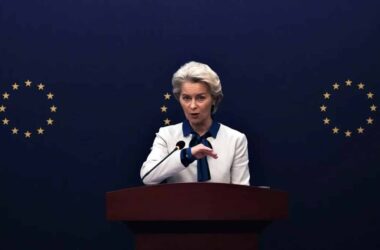In a new round of saber-rattling against tech platforms, European Commission President Ursula von der Leyen issued a stern warning to X (formerly Twitter), Meta, TikTok, and Apple, insisting that the EU would enforce its digital rules with unwavering force — “no matter who’s CEO.”
The comment, made in written responses to POLITICO, comes amid a broader campaign by the European Union to tighten control over what it views as “unregulated” digital space. Behind the veil of “protecting people” and enforcing rules “fairly,” there is growing concern that the EU’s Digital Services Act (DSA) is becoming a tool of political control — one that prioritizes state-approved narratives and seeks to muzzle dissent under the guise of fighting “disinformation.”
The War on X: Targeting a Platform for Free Speech
While von der Leyen’s remarks mentioned several major tech firms, the elephant in the room is clearly X — the platform once known as Twitter — now under the ownership of Elon Musk. Since acquiring Twitter in 2022, Musk has positioned X as a global platform for free speech, rolling back politically motivated content bans and restoring previously suspended accounts. These moves have won him admiration from free speech advocates and fierce criticism from establishment actors.
The EU’s hostility toward Musk’s stewardship of X is no secret. In January 2025, the European Commission concluded a preliminary probe into the platform, paving the way for potential fines — penalties that could reach up to 6% of global revenue under the DSA. The investigation focused on how X handles “illegal content” and alleged “disinformation” — broad and often vaguely defined categories that critics argue are increasingly being used to silence political opposition or alternative viewpoints.
The political subtext is clear. Musk’s hands-off approach to content moderation directly threatens the EU’s vision of a tightly curated digital space where the boundaries of acceptable discourse are decided not by users, but by bureaucrats in Brussels. The Commission has made X the scapegoat in its campaign, pressuring the platform to comply with so-called “transparency requirements” while selectively ignoring similar practices on EU-aligned platforms.
Censorship in the Name of Regulation
When von der Leyen says the EU doesn’t care “where a company’s from or who’s running it,” the statement rings hollow in light of the pattern emerging over the past two years. The platforms that have faced the most scrutiny are those that resist conforming to the EU’s preferred standards of content control — with X being the prime example.
In 2023, EU Commissioner Thierry Breton publicly threatened X with sanctions after Musk refused to take down posts deemed “disinformation” about the war in Ukraine and migrant crime in Europe. The Commission cited violations of the DSA and even floated the idea of a full ban on X within the EU — a proposal that sparked outrage among civil liberties organizations and ignited a global debate about digital censorship in democratic societies.
Even mainstream media questioned the overreach. The Guardian, no stranger to pro-EU sentiment, warned in an editorial that the EU risked becoming a “digital nanny state” if it continued to criminalize platforms that allowed open political debate.
Despite this backlash, the Commission has doubled down, emboldened by a regulatory framework that effectively allows it to demand compliance from private companies or face crippling penalties. The irony, of course, is that in defending the “rules voted by co-legislators,” von der Leyen glosses over the fact that these rules were not subject to direct democratic input from the very users they impact. The DSA was not voted on by European citizens — it was crafted behind closed doors by policymakers and lobbyists in Brussels.
The Political Context: 2024 European Elections and Beyond
This renewed regulatory push comes just months after the 2024 European Parliament elections, where mainstream centrist parties — including von der Leyen’s European People’s Party — suffered significant losses to anti-establishment challengers. Many of these challengers relied heavily on platforms like X to bypass traditional media gatekeepers and speak directly to voters.
In this context, the EU’s crackdown on social media is not just about content moderation — it’s about reasserting control over a shifting political landscape. The internet, and especially platforms like X, has become the new battleground where narratives are contested, alliances are formed, and power structures are questioned.
The timing of von der Leyen’s message — ahead of her expected bid for a second term as Commission President — cannot be ignored. With new conservative movements rising across Europe, from Hungary and Italy to the Netherlands and Germany, the Brussels elite appears increasingly desperate to suppress what it sees as “disruptive” speech.
What’s at Stake for Democracy and Free Speech
The threat to X — and by extension, to digital free expression — should concern everyone who values open discourse. While the EU frames its actions as protecting citizens from harm, the reality is that its regulatory campaign risks establishing a de facto Ministry of Truth, where only sanctioned viewpoints are allowed to circulate freely.
In a democracy, the cure for bad speech is more speech — not censorship. That principle has underpinned Western liberal democracies for decades. Yet the EU seems determined to shift toward a model more akin to China’s managed internet — a place where the state, not the people, determines what truth is.
It is worth recalling that many of the most consequential political movements of our time — from the Arab Spring to the Gilets Jaunes, to the rise of anti-establishment parties in Europe — gained traction precisely because of platforms that allowed for decentralized communication. Undermining these platforms under the guise of “safety” or “compliance” risks eroding the very foundations of democracy.
Elon Musk as a Symbol of Resistance?
Whatever one may think of Elon Musk personally, his leadership of X has become emblematic of a broader resistance to state overreach in the digital age. By refusing to play along with the EU’s increasingly authoritarian digital policies, Musk has created space for dissenting voices to re-emerge — voices that had been sidelined during the era of mass deplatforming and algorithmic censorship.
Of course, X is not perfect. No platform is. But its commitment to transparency, open algorithms, and speech rights marks a stark contrast to the bureaucratic opacity and ideological rigidity coming from Brussels.
As the EU prepares to escalate its campaign, freedom advocates around the world must ask themselves: Who gets to decide what we can say, share, and read online? And what kind of digital future are we building — one of free citizens, or of monitored subjects?
The EU’s regulatory apparatus is now moving full steam ahead. Von der Leyen’s warning is not just a bureaucratic note — it is a declaration of digital surveillance, where political elites reserve the right to control speech in the name of “order.” For those who believe in freedom — of thought, of speech, and of digital self-determination — this is a fight that cannot be ignored.
If the EU succeeds in forcing platforms like X into submission, the consequences will be felt far beyond Europe. Other regimes will take note. Precedents will be set. And the internet — once envisioned as the great democratic equalizer — may become little more than a government-approved echo chamber.
The time to speak out is now. Because if we wait until “compliance” becomes law, speech may no longer be free.




